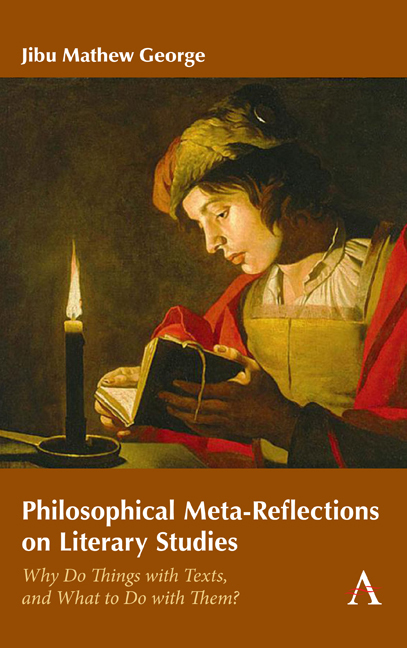 Philosophical Meta-Reflections on Literary Studies
Philosophical Meta-Reflections on Literary Studies Book contents
- Frontmatter
- Dedication
- Content
- Acknowledgements
- Introduction
- 1 The Why and Wherefore of Academic Disciplines: The Humanities and the Human World Process
- 2 If Literature were to Disappear from the Spectrum of Disciplines …
- 3 Beyond for and Against: Tendencies of Contemporary Criticism
- 4 The Aesthetic and the Political
- References
- Index
3 - Beyond for and Against: Tendencies of Contemporary Criticism
Published online by Cambridge University Press: 11 December 2019
- Frontmatter
- Dedication
- Content
- Acknowledgements
- Introduction
- 1 The Why and Wherefore of Academic Disciplines: The Humanities and the Human World Process
- 2 If Literature were to Disappear from the Spectrum of Disciplines …
- 3 Beyond for and Against: Tendencies of Contemporary Criticism
- 4 The Aesthetic and the Political
- References
- Index
Summary
What to Do with Texts?
As part of the ongoing ‘transvaluation’ of established literary values, we have successfully argued and accepted that texts, authors, genres and social groups other than the canonical ones ought to be studied as part of the syllabi. In other words, we are past the phase of ‘restricted entry’, and objects of study have democratically multiplied. But there has been no corresponding rethinking, at least to the same degree, on what more can be done with the old and the new entrants. Somehow, originality in research has come to mean writing theses and books on less-canonical works. When we decide merely to study less-known works (it is an open secret that first-generation critics have certain advantages), we are mainly questioning the canon, not necessarily devising ways of dealing with texts which have hitherto been excluded, though new texts may demand new approaches.
During my initial years as a research scholar, I was asked to read up the secondary materials on a certain author – ‘a love that dare not speak its name’ – other than James Joyce, on whose works I did my doctoral research, so as to have an overview of the then current trends in practical criticism. After a year-long reading I found that three-fourths of the critical materials said one or more of the following:
Meaning is undecidable.
Literary texts are entangled in discourses of race, class and gender.
Some concept or the other is a cultural construct.
As we know, the first is a theoretical insight of deconstruction. The second comes to us from schools of ideological criticism, such as postcolonialism, Marxism and feminism. Harold Bloom terms these collectively ‘the School of Resentment’ (1995, 23). The third demonstrates constructivism, the ‘in-thing’ in academia today. Gender is a construct. So is sexuality, nation, subject, disability and what not. Heck! Literature itself is a construct. Later I learnt that these tendencies were representative of contemporary literary criticism in general. I also learnt that statements that did not say any of these three things were likely to be dismissed as ‘humanistic’.
- Type
- Chapter
- Information
- Philosophical Meta-Reflections on Literary StudiesWhy Do Things with Texts, and What to Do with Them?, pp. 53 - 92Publisher: Anthem PressPrint publication year: 2019
